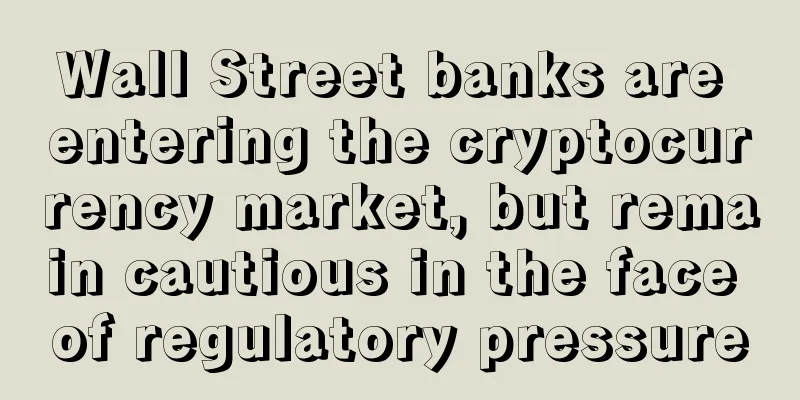Wall Street banks are entering the cryptocurrency market, but remain cautious in the face of regulatory pressure

|
As customer demand for cryptocurrency investments grows, more and more investment banks have begun to provide cryptocurrency services. However, facing heavy regulatory pressure, Wall Street banks remain cautious about deploying cryptocurrencies. Goldman Sachs Chief Executive David Solomon told a congressional hearing earlier this month that the bank is restricted by regulations from acting as a primary trader in cryptocurrencies or owning a majority of them. Bank of America Corp. has launched a new team dedicated to cryptocurrencies, the latest effort by Wall Street to try to profit from investors’ craze for digital assets. According to an internal memo from Bank of America to employees, the team, led by Alkesh Shah, will also cover technologies related to digital currencies and will report to Michael Maras, Bank of America's global head of fixed income, currencies and commodities research. “Cryptocurrencies and digital assets comprise one of the fastest growing emerging technology ecosystems,” Candace Browning, head of global research at Bank of America, said in the memo. “We are uniquely positioned to provide thought leadership with our robust industry research analysis, market-leading global payments platform and blockchain expertise.” Wall Street banks are looking to expand into the world of cryptocurrencies, with many trying to offer wealth management products or custody services for the asset class. Some, including JPMorgan Chase & Co. and Goldman Sachs Group Inc., have already started offering cryptocurrency futures trading. Goldman Sachs’ prime brokerage unit is clearing and settling cryptocurrency exchange-traded products (ETPs) for some hedge fund clients in Europe. The bank is currently offering these services to a limited number of clients and has been reviewing the matter internally as it looks to roll out the service to more clients. JPMorgan Chase & Co. has become the first major bank to expand cryptocurrency trading privileges, and not just to high-net-worth clients. The bank, which has been aggressively growing its $630 billion wealth management business, told wealth management advisers in a memo earlier this week that they can now buy and sell orders for five cryptocurrency products, four from Grayscale and one from Osprey Funds, effective July 19. Nadine Chakar, vice president and head of global markets at State Street, told The Scoop that State Street is working with clients to develop solutions to help them allocate to Bitcoin and other crypto assets. She noted that despite the recent price plunge in crypto assets, market interest has not waned: "The price depreciation has not affected demand and interest at all. I think we still see a lot of people enthusiastically embracing digital assets, in some cases cryptocurrencies. And every day you see some large hedge fund or some large investor describing their support for digital technology." Bank of New York Mellon is following in the footsteps of U.S. banking giant State Street Corp. and will provide business support for new bank-grade cryptocurrency trading platform Pure Digital. The prime brokerage arm of Bank of America has begun clearing and settling cryptocurrency exchange-traded products (ETPs) for European hedge funds. Bank of America has also approved bitcoin futures trading for some clients and is clearing cash-settled contracts. Market demand for products such as crypto ETPs has been increasing. According to Bloomberg data, Goldman Sachs, ICAP, JPMorgan Chase and UBS are all buying 21Shares Polkadot ETPs for their clients. Citigroup and UBS are still in a state of indecision. Itay Tuchman, head of Citigroup's global foreign exchange business, told the Financial Times that since August last year, the bank has seen a surge in interest in cryptocurrencies among major clients, and Citigroup is considering providing trading, custody and financing services. Tuchman said Citigroup is not in a hurry to make a decision, "When we are confident that we can create products that are beneficial to our customers and that regulators can support, we will enter (the cryptocurrency market)." UBS said in a report that cryptocurrencies are speculative assets, not currencies, and regulation is just one of its many drawbacks. UBS warned that the recent plunge in cryptocurrencies highlights the volatility and speculation of this relatively new asset class, which is not suitable for inclusion in investors' portfolios, and advised clients to be cautious in crypto speculation. Behind the entry of Wall Street financial institutions into cryptocurrency services, they all mentioned the growing customer demand. In the future, banks that are hesitant to enter the cryptocurrency field may eventually be forced to respond to the growing customer demand. Cryptocurrency has developed into a force that Wall Street giants cannot ignore. The second quarter earnings report in the United States recently kicked off, and many companies have increased their holdings of Bitcoin in various ways. For example, wealth management company Edge Wealth Management disclosed its ownership of 54,134 shares of Grayscale Bitcoin Trust (GBTC) in the 13F-HR form submitted to the U.S. Securities and Exchange Commission (SEC), an increase of 43.95% from the 37,605 shares it held in April. Since April, Rothschild Investments, a multi-billion dollar investment company, has quadrupled its exposure to Bitcoin. ARK Fund bought more than $10 million of GBTC. The New Jersey Pension Fund invested $7 million in Bitcoin mining stocks. Due to the support of market funds, Bitcoin has recently rebounded rapidly from below 30,000 to around 34,000. Wells Fargo, Citigroup, JPMorgan Chase, Goldman Sachs, Morgan Stanley and Bank of America appeared before the Senate Banking Committee as well as the House Financial Services Panel. "We continue to closely monitor the development of cryptocurrencies, which have emerged as alternative investment products, although their status as currencies and payment mechanisms remains volatile," Wells Fargo CEO Charles Scharf said in a statement. |
<<: Amazon may accept BTC payments, and the market is soaring
>>: Thinking | EIP-1559 and the Road to Ethereum
Recommend
Due to the flood disaster in Sichuan, the computing power of mining pools such as F2Pool and Biyin dropped by more than 15%
According to BlockBeats, on August 18, according ...
What are the differences in fortune between men and women with narrow eyes?
For a person, the distance between eyes is actual...
What kind of woman is liked by her mother-in-law?
The relationship between mother-in-law and daught...
What does it mean when the career line ends before the wisdom line?
If you know what kind of influence the wisdom lin...
The five most taboo parts of the body to have scars
In life, we are bound to get injured and leave sca...
Blockchain originated from Bitcoin, but it cannot stop at Bitcoin
The bigwigs of the financial world are throwing m...
What does a mole on the foot mean?
Moles are the core of physiognomy , and moles can...
What does it mean to have a pattern on the palm? Can it predict a person's fate?
Many people believe that palmistry can reveal a p...
Germany's largest mobile game developer Good Game announces support for Bitcoin in-app purchases
Recently, GoodGame, the largest mobile game devel...
Is it good or bad to have an asymmetrical face? An analysis of an asymmetrical face
Is it good to have an asymmetrical face? Many peo...
Which people are more likely to be bullied?
When we were young, we all disliked what the teac...
Will the return from multiple nesting dolls be high? On the self-adjustment of Defi return rates
When DEFI was hot, many people started to engage ...
Palm lines that indicate easy temptation by opposite sex
Palm lines that indicate easy temptation by oppos...
A complete analysis of the face of a cruel and ruthless woman
Judging from facial features, what are the charact...
AntPool officially participates in the EOS super node election
AntPool is the world's leading mining service...









